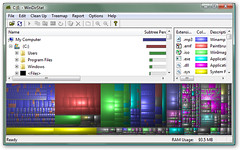Freeing up drive space on Windows XP
 I just cleaned up my computer in preparation for an upgrade to Vista. Here's how I did it:
I just cleaned up my computer in preparation for an upgrade to Vista. Here's how I did it:
- Empty Recycle Bin (Yes, I know. Not rocket surgery so far. Keep with me, I'm getting warmed up.)
- If you bought a PC with XP preinstalled, consider running the PC Decrapifier. It clears out the useless bundled software the manufacturer included to cut costs through renewal kickbacks.
- Uninstall any programs you don't need. My criteria: If I can't remember what it is or haven't used it in 6 months, I don't need it. I use SAFARP (Small and Fast Add Remove Programs), but Windows Add / Remove Programs works here. [UPDATE] A comment reminded of something here - XP Hotfix Files. I've used (and recommend) Doug Knox's "XP Remove Hotfix Backup" program.
- Run CCleaner to clean up temporary files and clear out orphaned registry keys. Registry cleanup used to be simple until Office started stashing unused keys to indicate features which would be installed on first use, after which registry cleaners often did more harm than good. However, CCleaner is regularly updated and has always worked for me. If you're scared to monkey with the registry, CCleaner will still help find unused temporary (permatemp?) files which can be removed.
- Start looking for big files to be removed. I use FolderSize and WinDirStat for this. Actually, I use FolderSize more for day to day stuff, but for clearing out the underbrush with a machete style work, you can't beat WinDirStat. The treemap really helps you zoom in on the large files or folders; when you click on them they're automatically selected for you in the folder view above. By the way, the screenshot shows it working in Vista.
I can't tell you what kind of files to look for, but I can tell you what I found on my system. I'm a Microsoft.NET developer, so this list is tilted that way. If you'd like to post some specifics which are geared towards other user types, please do so in the comments.
So, here's what I found:
- FolderShare Trash (C:\Documents and Settings\USER\Local Settings\Application Data\FolderShare\trash). FolderShare keeps backups of shared files after you've deleted them from the share, so if you've used FolderShare to transfer any large files they're probably still hanging out in your trash.
- Unneeded ISO and Virtual Machine hard drives. Yeah, semi-obvious, but since this is a checklist of sorts I'd be remiss if I didn't mention them. For Virtual PC and Virtual Server, you're looking for VHD files. For VMWare, I believe you're looking for VMDK files. Also - if you're using VPC, look for Virtual PC Undo files (.vud) files.
- SQL Server Backup files (.bak). I had several database backups I'd been holding on to "just in case" for a year or so. Gone.
- SQL Server log files (.ldf). This one deserves a sidebar... or actually another post. Short answer - for a developer machine you can probably just set the recovery model for the database to Simple, then shrink the database from within SSMS.
How about you? How do you clean up a computer?